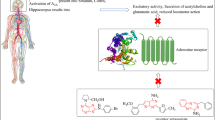
Overview
- Includes supplementary material: sn.pub/extras
Part of the book series: Handbook of Experimental Pharmacology (HEP, volume 193)
Access this book
Tax calculation will be finalised at checkout
Other ways to access
About this book
Since their discovery approximately 25 years ago, adenosine receptors have now emerged as important novel molecular targets in disease and drug discovery. These proteins play important roles in the entire spectrum of disease from inflammation to immune suppression. Because of their expression on a number of different cell types and in a number of different organ systems they play important roles in specific diseases, including asthma, rheumatoid arthritis, Parkinson’s disease, multiple sclerosis, Alzheimer’s disease, heart disease, stroke, cancer, sepsis, and obesity. As a result of intense investigations into understanding the molecular structures and pharmacology of these proteins, new molecules have been synthesized that have high specificity for these proteins and are now entering clinical trials. These molecules will define the next new classes of drugs for a number of diseases with unmet medical needs.
Similar content being viewed by others
Keywords
Table of contents (19 chapters)
-
Front Matter
Editors and Affiliations
Bibliographic Information
Book Title: Adenosine Receptors in Health and Disease
Editors: Constance N. Wilson, S. Jamal Mustafa
Series Title: Handbook of Experimental Pharmacology
DOI: https://doi.org/10.1007/978-3-540-89615-9
Publisher: Springer Berlin, Heidelberg
eBook Packages: Biomedical and Life Sciences, Biomedical and Life Sciences (R0)
Copyright Information: Springer-Verlag Berlin Heidelberg 2009
Hardcover ISBN: 978-3-540-89614-2Due: 19 August 2009
Softcover ISBN: 978-3-662-50162-7Published: 23 August 2016
eBook ISBN: 978-3-540-89615-9Published: 28 July 2009
Series ISSN: 0171-2004
Series E-ISSN: 1865-0325
Edition Number: 1
Number of Pages: XIII, 652
Topics: Pharmacology/Toxicology, Human Physiology, Cell Biology



